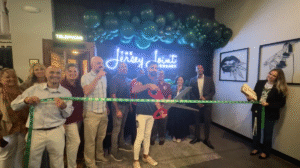Interest in psilocybin or magic mushroom retreats for therapy has grown rapidly as people explore their potential for healing and reflection.
Table of contents
In Oregon, there is now a legal path through supervised psychedelic retreats. During retreats, people use psilocybin or magic mushrooms in a supportive and structured environment.
These retreats bring together science-backed preparation and guided sessions to influence how you think, feel, and connect with yourself. For those new to psychedelic-assisted healing, it is natural to wonder what the experience feels like.
This guide shares what you need to know before joining a legal psilocybin retreat. It helps you make informed choices, prepare mindfully, and find the right setting for a meaningful journey.
1. Understand Oregon’s Measure 109 Law
Oregon made history by becoming the first state in the United States to legalize supervised psilocybin therapy. It was done through the referendum Measure 109, known as the Psilocybin Services Act, which was approved in 2020. The law allows those 21 and older to take part in guided psychedelic sessions at licensed centers.
It marked a shift from underground practices to a regulated, safety-focused model designed to ensure participant well-being.
This law does not legalize recreational use. Psilocybin can only be consumed within licensed facilities under the supervision of certified facilitators who are trained to guide and support participants throughout the experience.
The goal is to create a psychedelic environment where emotional, psychological, and physical safety are prioritized.
Several other states are still in early discussions about therapeutic psilocybin use, including New Jersey.
Anyone considering a retreat should verify its legitimacy through the Oregon Health Authority’s (OHA) database.
2. Licensed Retreats Follow Strict Standards
A legal psilocybin retreat is more than a peaceful getaway. It’s a safe environment to help participants explore altered states of consciousness with professional guidance.
Facilitators must complete extensive training before certification. Their training covers trauma-informed care, ethics, and psychedelic-assisted healing. It guarantees sessions are guided by someone qualified to handle intense experiences.
Licensed retreats are required to maintain:
- Secure and private facilities that meet OHA standards.
- Supervision during guided psychedelic sessions by certified facilitators.
- Emergency response plans and integration support after each session.
Not all legal psilocybin retreat programs uphold the same level of care. According to Confluence Retreats, one of Oregon’s licensed psilocybin centers, “safety begins long before the first session. From medical readiness to emotional preparation, each protocol exists to create a container where participants can explore psilocybin’s effects without fear.”
These safeguards help transform curiosity into a truly grounded and therapeutic experience.
3. Participant Screening Is Crucial
The first stage is a thorough intake and screening process that determines whether the experience is appropriate for participants.
Participants complete forms that cover mental health, medication, and medical conditions. This allows facilitators to identify any potential issues that could increase risk. Individuals may be advised not to participate if they:
- Have a history of schizophrenia, bipolar disorder, or seizures.
- Are pregnant or breastfeeding.
- Take medications such as SSRIs.
- Have heart, liver, or kidney concerns.
Declining participation protects participants from complications that can arise while tripping.
Honesty is crucial. Sharing accurate information helps facilitators set an appropriate dosage and design a supportive environment. In clinical settings, a therapeutic psilocybin dose of about 30 mg per 70 kg or 155 lbs. of body weight is often used. Trips last 3 to 6 hours. Participants may experience:
- Time and space distortion.
- Heightened sensory perception or mild hallucinations.
- Changes in body temperature, heart rate, or blood pressure.
- Emotional release or a sense of euphoria.
Ask your facilitator which mushroom species and dosage they plan to use to ensure safety.
4. Mental and Physical Preparation
Entering the retreat grounded and clear-minded helps your body and mind respond with openness rather than resistance.
Preparation begins before the first session. Facilitators suggest practical steps to help you create the right conditions for a stable and insightful journey, such as:
- Avoid alcohol and medications that interfere with psilocybin.
- Limit caffeine and processed foods to ensure calmness.
- Practice mindful breathwork or journal to clarify your intentions.
This shapes both the mindset, known as the “set,” and the environment or setting for “set and setting”. When these are aligned, your psilocybin experience becomes a conscious collaboration between preparation, presence, and healing.
5. Experience Is Guided and Structured
A psilocybin retreat begins with an atmosphere of calm and purpose. Every part of it is planned to help participants feel grounded, guided, and supported. It ensures exploration happens within clear emotional and physical boundaries.
During the guided psychedelic sessions, participants are supported in tranquil spaces that may include nature-inspired surroundings or softly lit ceremonial rooms.
6. Integration for Lasting Benefits
Once the session concludes, integration discussions provide space to process and reflect. These conversations help translate the experience into daily life. Integration unfolds through intentional reflection and gentle self-work. Many participants:
- Journal about their thoughts and realizations to gain perspective.
- Practice meditation or grounding exercises to stay centered.
- Speak with a therapist or join post-retreat circles for support.
Licensed centers typically provide trained integration coaches or follow-up meetings to guide this stage with care. Scientific research from Johns Hopkins and New York University found that participants who focus on integration experience greater improvements in mood, empathy, and mental clarity.
7. Choose Reputable Psilocybin Retreats
Not every psilocybin retreat online is what it claims to be. Some are quiet sanctuaries run by trained facilitators. But others operate without oversight or safety measures.
A legitimate retreat will never ask you to take trust on faith. It will outline its licensing, staff qualifications, and participant care policies. When evaluating a legal program:
- Verify its Oregon license and facilitator certifications.
- Read authentic testimonials from previous participants.
- Understand refund, privacy, and data policies.
- Ask about integration support and how emergencies are handled.
Conclusion
A legal psilocybin retreat provides a carefully guided space for reflection, healing, and self-discovery. Approach the experience with curiosity and respect. When preparation, research, and reflection come together, psilocybin becomes a path toward lasting change rather than a fleeting moment.











